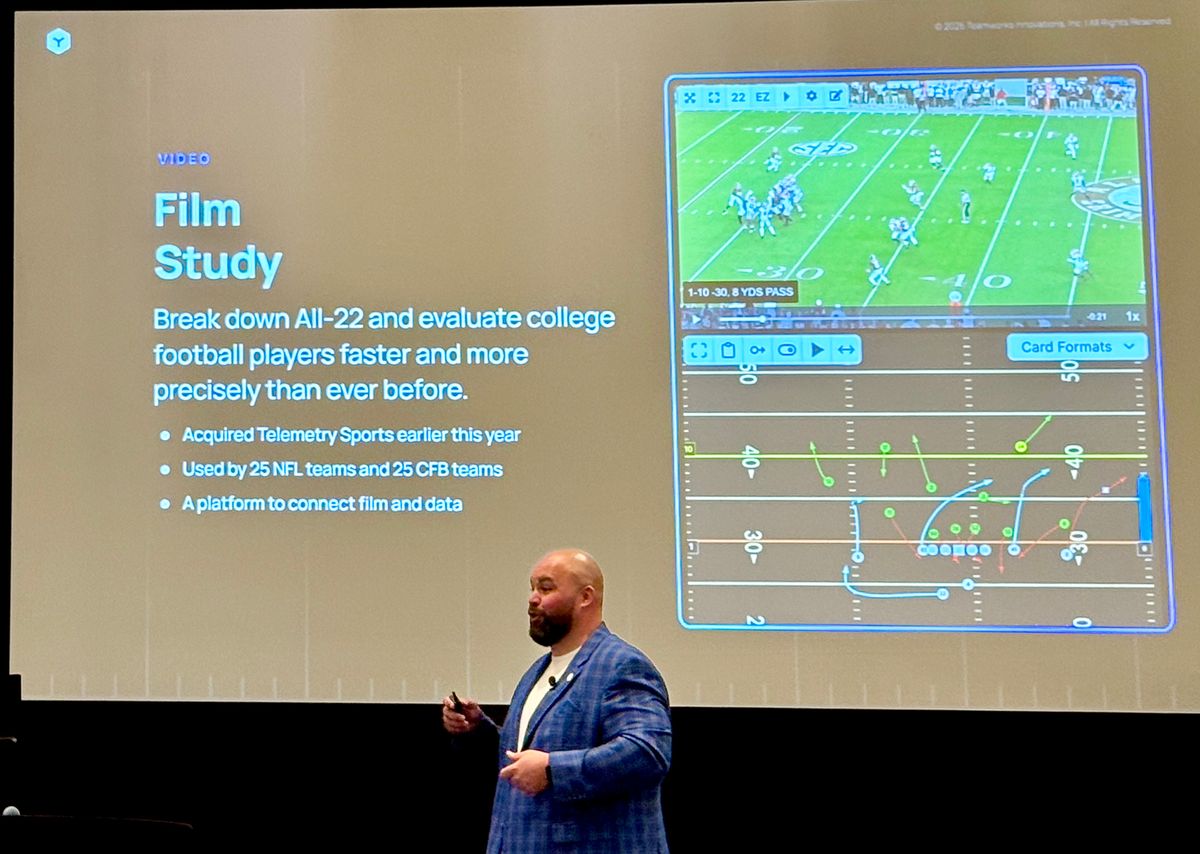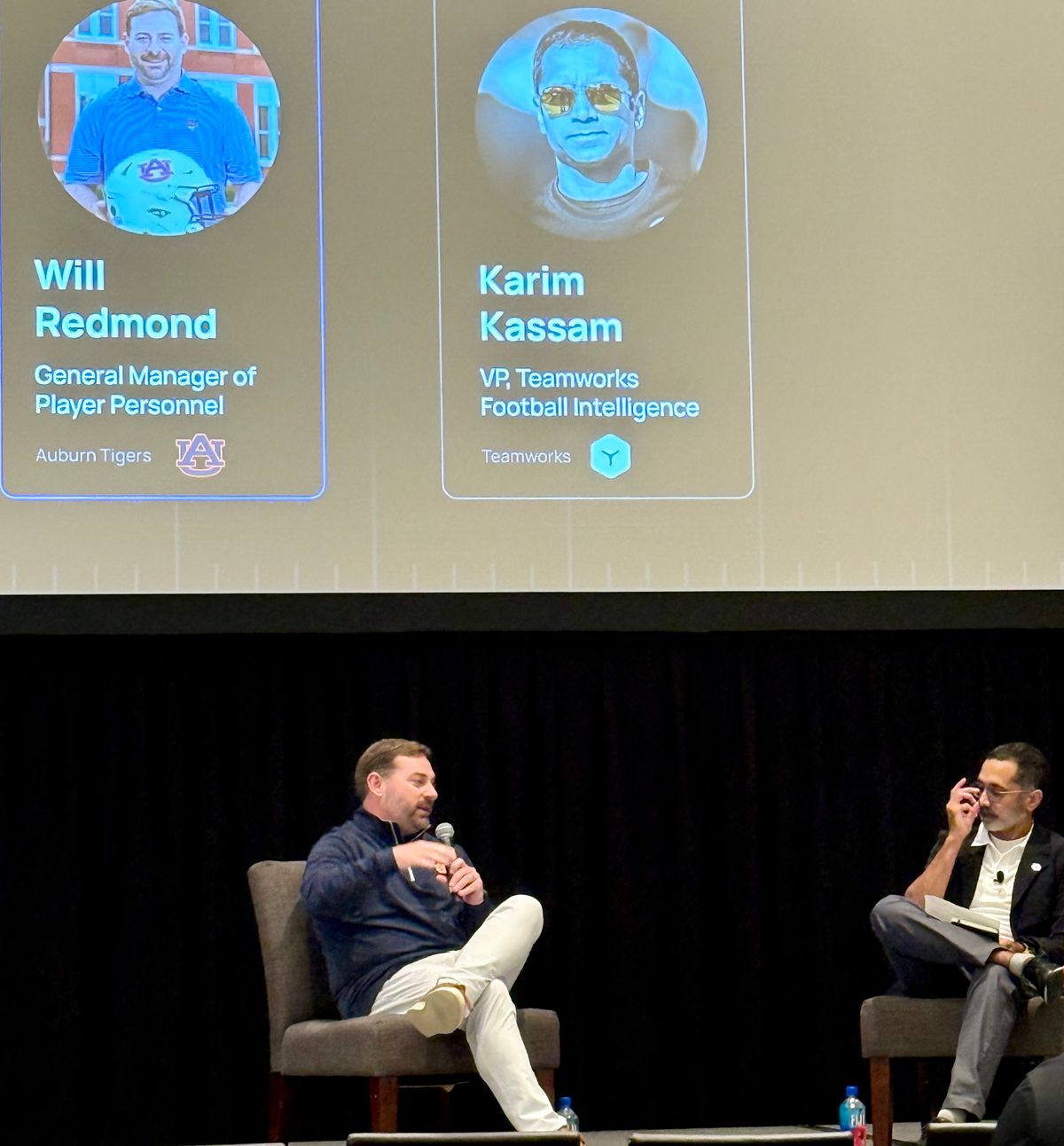
NASHVILLE, Tenn. – A football. Helmet and uniform. Teamworks.
In the sport’s current iteration, the three virtually are inseparable.
That much was evident during the sixth-annual Personnel and Recruiting Symposium across three steamy days in Nashville.
Touting the “Future of Football,” Teamworks went in-depth with two of its latest signature components – Teamworks Coaching and Teamworks Scouting platforms.
The present already is here, and Teamworks now touches every component of the sport.
No longer a mere organizational lifeline for football operations directors, consider these staggering numbers from the hydra-like football brainstem:
→ More than $178 million dollars in payments to student-athletes have been doled out via the Teamworks Wallet
→ More than 1.6 million messages have been sent to prospective recruits via the Teamworks Recruiting app
→ More than $520 million has been “budgeted and committed in Teamworks GM to support rev-share strategy.”
"Because in college football, things are changing so quickly," Kirk Herbstreit, a 30-year college football analyst and former Ohio State quarterback, told the capacity crowd. "It puts a lot of pressure on not just (general managers) and recruiting but [media]. I look at this sport like I look at my kids, I genuinely love college football. ...
"It’s thriving on Saturdays. I’m very protective of it, I worry about it. I stay hopeful that the people in this room ... I'm hoping we get some stability at some point that we can hang our hat on."
Per Sam Curtis, a former DFO with stops at Tennessee, USC and Memphis who’s entering his fifth year as the company’s manager of football partnerships, Teamworks now is used by every NFL franchise and “99% of college football,” the latter number including every FBS member program.
But it’s the scouting program that the company used as the central element of its presenting sponsor appearance at the P&R Symposium that drew a record crowd of more than 1,100 attendees, including agents from across the country, numbers NFL scouts and executives and hundreds of college football programs.
“This is a unified football ecosystem for evaluation, recruiting, analytics and film study,” Nate Jahn, Teamworks Scouting, showed the crowd in a demonstration that saw him sort through collegiate players strictly via “edge player traits, sorted by pass rush, run filters and let’s look at all players from Alabama, California and Florida.
“Then let’s look at younger guys, freshmen through redshirt-sophomore and guys with at least 200 snaps.”
Soon, Jahn’s search parameters yield three players.
Karim Kassam closes the presentation, first revealing the methodology the program utilizes to calculate “game speed.”
It’s a formula, says Kassam, a former member of the Pittsburgh Steelers front office, that “considers all available data, ignores low effort plays, care most about a player’s potential here and identify top speed and acceleration moments to infer maximum potential speed.”

Photo/John Brice
Auburn G.M. Will Redmond leans on advice from famed former NFL executive Bill Polian, who told him, ‘Hey, man, if you’re hitting at 54 percent, you’re pretty damn good.’
A former FootballScoop Player Personnel Director of the Year, Will Redmond, now Auburn’s general manager, lends intimate insight the burgeoning analytics-scouting synergy in college football.
“For us, we’re a team that’s going to really emphasize high school classes,” said Redmond, a Tennessee grad with notable stops at MTSU, Kansas and LSU before Auburn. “Coach (Hugh) Freeze emphasized that’s how we’re going to build sustained success.
“That leads us into what takes need to be for the high school ranks, production lost, filling gaps with starters in the December/January Portal. We try and operate as much as possible in roster management and not roster reaction.”
College football’s particular investment, both in personnel/recruiting staff growth and resources, resonates particularly of late for Redmond’s Auburn operation. The Tigers are just weeks removed from plucking Jovon Hubbard away from SEC rival Arkansas to serve as Redmond’s assistant G.M. while also bringing Rex Hogan, a well-regarded veteran with stints at Notre Dame, Utah, Florida and in the NFL, as its director of college scouting.
“You have coaches consistently saying, ‘Bring me ‘X’ player,’” Redmond said. “For us, we got Cam Coleman, a wide receiver who currently projects as a first-round (NFL) Draft pick.
“We’ll hear from Coach Freeze: ‘Bring me the next Cam Coleman.’”
With few impediments to thwart de facto player free agency and roster churn more viable than conference stability, it’s a microwave society in college football.
“Time is of the essence in all of this,” Redmond said. “You can’t work at the speed of local government; 48 hours in the Portal is two weeks in the real world.”
Clock's ticking.
-544x306.jpg)